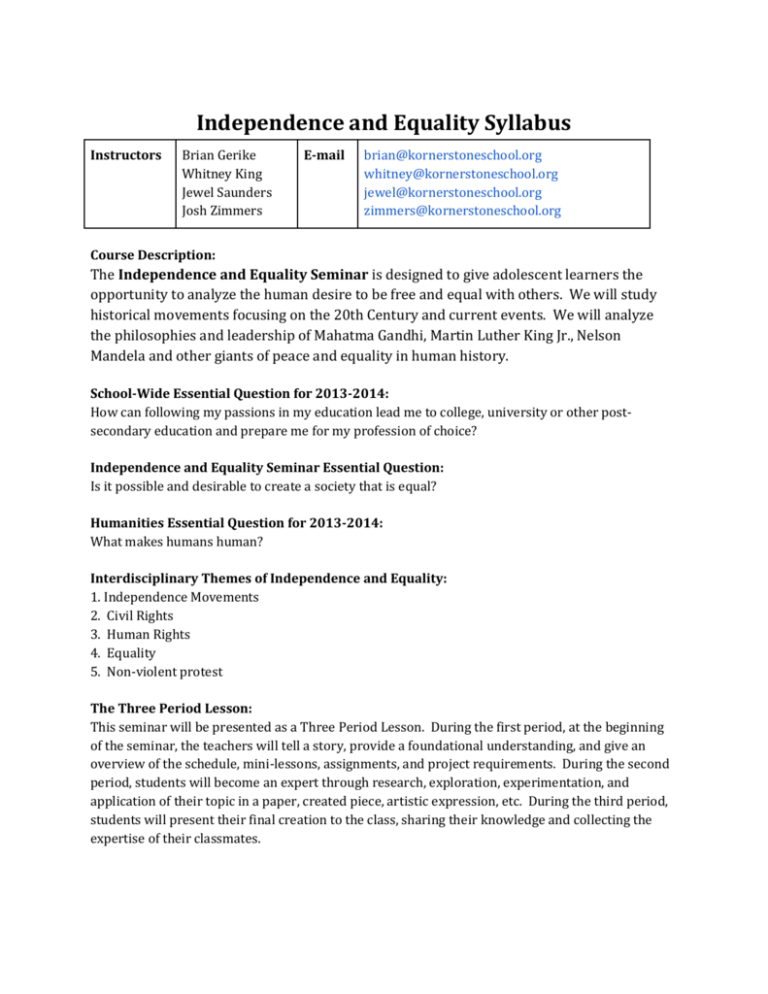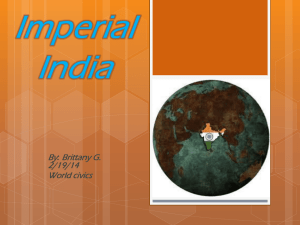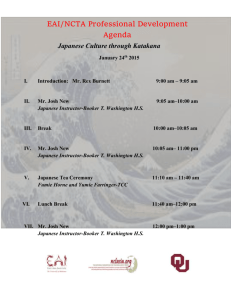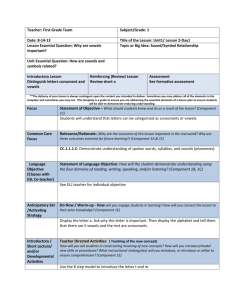Independence and Equality Syllabus
advertisement

Independence and Equality Syllabus Instructors Brian Gerike Whitney King Jewel Saunders Josh Zimmers E-mail brian@kornerstoneschool.org whitney@kornerstoneschool.org jewel@kornerstoneschool.org zimmers@kornerstoneschool.org Course Description: The Independence and Equality Seminar is designed to give adolescent learners the opportunity to analyze the human desire to be free and equal with others. We will study historical movements focusing on the 20th Century and current events. We will analyze the philosophies and leadership of Mahatma Gandhi, Martin Luther King Jr., Nelson Mandela and other giants of peace and equality in human history. School-Wide Essential Question for 2013-2014: How can following my passions in my education lead me to college, university or other postsecondary education and prepare me for my profession of choice? Independence and Equality Seminar Essential Question: Is it possible and desirable to create a society that is equal? Humanities Essential Question for 2013-2014: What makes humans human? Interdisciplinary Themes of Independence and Equality: 1. Independence Movements 2. Civil Rights 3. Human Rights 4. Equality 5. Non-violent protest The Three Period Lesson: This seminar will be presented as a Three Period Lesson. During the first period, at the beginning of the seminar, the teachers will tell a story, provide a foundational understanding, and give an overview of the schedule, mini-lessons, assignments, and project requirements. During the second period, students will become an expert through research, exploration, experimentation, and application of their topic in a paper, created piece, artistic expression, etc. During the third period, students will present their final creation to the class, sharing their knowledge and collecting the expertise of their classmates. Grading: Projects and papers will be graded on standards-based rubrics based on the 5-point rubric grading system. Assignments will be tied to State Standards, and district Learning Targets, but students’ choice will be preserved through many options. Late Assignment Policy: The Three Period Lesson relies on a set process of teaching, learning, and cooperation among students to succeed. Deadlines need to be final and attendance is essential. Projects will not be accepted late. If you are absent on a due date, a parent must call for a project to be accepted late. Academic Integrity: M.L.A. bibliography and source citing will be taught during the first unit and will be required for every project and paper. Papers without proper notation will be considered plagiarized. Evaluations: 1. Current Events - Focus on developments in Ukraine 2. Local Government/Issues - Position paper 3. Three case studies 4. Mini-Project - Film Review 5. Project - Ukraine Simulation - or - Local Issue/Government - or - Independence Movement Project Assigned Resources Bibliography: Primary sources from case studies Gandhi. Dir. Richard Attenborough. Perf. Ben Kingsley, Candice Bergen, Martin Sheen, Edward Fox, and John Gielgud. Columbia Pictures, 1982. Film. Malcolm X. Dir. Spike Lee. Perf. Denzel Washington, Angela Bassett, Albert Hall, Al Freedom Jr. And Delroy Lindo. Warner Bros., 1992. Film. Standards and Credits: All students will earn: Contemporary World Issues 0.25 Economics 0.25 Modern Intellectual History 0.25 Political Science 0.25 Individual or Group Projects and Presentations can earn: Science, Math, Art, Technology, Business, Social Studies, English, etc. Course Outline: I. Baseline Test II. Overview - first period lesson III. Case Studies - Indian Independence - Colonialism - Ghandi - Non-violent protest - Split of India and Pakistan - Civil Rights Movement - Colonialism - Slavery, Civil War and Reconstruction - Jim Crow, Dredd Scott, Brown vs. Board - Bus Boycott - Martin Luther King (look at other orgs, leaders, methods of protest) - Civil Rights Act - South African - Colonialism - Apartheid - Nelson Mandela - Truth and Reconciliation CALENDAR March - June Monday 17 Professional Development Day Tuesday 18 Orientation Wednesday 19 Orientation Thursday 20 Baseline/ Independence and Equality Overview Jewel-Baseline Friday 21 History of Inequity, Colonialism Ethics/Morality of Equity and Independence Josh 24 Current 25 Local 26 Indian 27 Indian 28 Indian Events/ Ukraine Government/ Issues Josh*/Jewel (Scavenger Hunt) Josh*/Jewel Independence Movement Case Study (History) Josh/Jewel* 31 Current Events/ Ukraine 1 Local Government/ Issues 2 Civil Rights Movement Case Study (History) Jewel (Bill to LawJewel) Jewel Independence Movement Case Study (Econ, Social, political) Josh/Jewel* Independence Movement Case Study (Current Status) 3 Civil Rights Movement Case Study (Econ,Social, political) 4 Civil Rights Movement Case Study (Current status) Josh*/Jewel Josh*/Jewel Jewel 7 8 9 South Africa Case Study (History) 10 South Africa Case Study (Econ, Poli, Social) 11 South Africa Case Study (Current Status) Current Events/ Ukraine Local Government/ Issues Josh/Jewel* (Position Proj) Josh*/Jewel Josh*/Jewel Josh*/Jewel Josh/Jewel* 14 Introduce/Start Mini Film Project Jewel 15 Mini Film Project 16 Mini Film Project 17 SPRING BREAK 18 SPRING BREAK 21 SPRING BREAK 22 SPRING BREAK 23 Mini Film Project 24 Mini Film Project 25 Mini Film Project Presentations 28 Introduce/Start Independent Project (Ukraine simulation or Local issue/governm ent or Indie 29 Independent Project 30 Independent Project 1 Independent Project 2 Independent Project Independence project) Josh 5 Independent Project 6 Independent Project 7 Independent Project 8 Independent Project 9 Independent Project 12 Independent Project 13 Independent Project 14 Independent Project 15 16 Presentations Projects Due Presentations Senior Event Night 19 20 21 22 Event Night 23 Baseline/ Reflections 26 Memorial Day No School 27 28 29 30 2 3 Last Day of School Potential Learning Targets Comparative economics (regions or Econ time) : omics SS.D.12.2 SS.D.12.2 Use basic economic concepts (such as supply and demand; production, distribution, and consumption; labor, wages, and capital; inflation and deflation; market economy and command economy) to compare and contrast local, regional, and national economies. Financial Economic institutions : s SS.D.12.14 Econo mics Eco nom ics Eco nom ics Eco nom ics Financial SS.D.12.9 Explain the operations of common financial instruments (such as stocks institutions : and bonds) and financial institutions (such as credit companies, banks, and SS.D.12.9 insurance companies). Government influence on the economy : SS.D.12.14 Government influence on the economy : SS.D.12.5 Government influence on the economy : SS.D.12.8 Econ International omic trade : s SS.D.12.13 Ec on om ics SS.D.12.14 Analyze the economic roles of institutions, such as corporations and businesses, banks, labor unions, and the Federal Reserve System. SS.D.12.13 Describe and explain global economic interdependence and competition, using examples to illustrate their influence on national and international policies. Unequal distribution of wealth or natural resources/Poverty : SS.D.12.12 Political Science and Citizenship Political Science and Citizenship SS.D.12.14 Analyze the economic roles of institutions, such as corporations and businesses, banks, labor unions, and the Federal Reserve System. SS.D.12.5 Explain how federal budgetary policy and the Federal Reserve System's monetary policies influence overall levels of employment, interest rates, production, and prices. SS.D.12.8 Explain the basic characteristics of international trade, including absolute and comparative advantage, barriers to trade, exchange rates, and balance of trade. SS.D.12.12 Compare and contrast how values and beliefs, such as economic freedom, economic efficiency, equity, full employment, price stability, security, and growth, influence decisions in different economic systems. Civil Rights and similar movements : SS.C.12.14 Civil Rights and similar movements : SS.C.12.16 SS.C.12.14 Explain and analyze how different political and social movements have sought to mobilize public opinion and obtain governmental support in order to achieve their goals. SS.C.12.16 Describe the evolution of movements to assert rights by people with disabilities, ethnic and racial groups, minorities, and women. So cial Stu die s 912 Politi cal Scie nce and Citiz ensh ip Soci al Studi es 912 SS.C.12.2 Describe how different political systems define and protect individual human rights. SS.C.12.5 Analyze different theories of how governmental powers might be used to help promote or hinder liberty, equality, and justice, and develop Compare a reasoned conclusion. SS.C.12.13 Describe and evaluate ideas of how society political should be organized and political power should be exercised, including the ideas systems : of monarchism, anarchism, socialism, fascism, and communism; compare these SS.C.12. ideas to those of representative democracy; and assess how such ideas have 2 worked in practice. Political Science and Citizensh ip Internation al organizatio ns : SS.C.12.12 Explain the United States' relationship to other nations and its role in international organizations, such as the United Nations, North Atlantic Treaty Organization, World Bank, International Monetary Fund, and North American Free Trade Agreement








